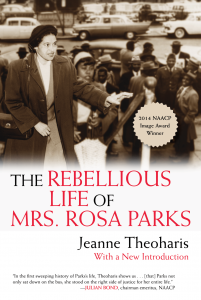

“The rich network of social and political organizations kept Montgomery’s class divided black community relatively connected. In addition to more than 50 church organizations, Montgomery was home to more than 50 social, political and mutual benefit groups at the time of the boycott. How long they worked to prepare for the fight is amazing. One of the joys of the book is the explanation of just how organized the women of Montgomery, Alabama were leading up to the bus boycott. It was these fights that laid the groundwork for the 1955 Montgomery bus boycott that did succeed. She described how hard it was to keep losing these battles. The book quotes Rosa Parks recalling her work in the 1940s against so many horrible injustices. A nation-wide campaign developed, but the fight was unsuccessful. As a new member of the Montgomery, Alabama chapter of the NAACP, a young Rosa Parks worked with Recy Taylor to fight for justice. Recy and her family and friends publicly identified her six attackers and sought criminal charges. The story of the abduction and rape of Recy Taylor of Abbeville, Alabama in 1944 begins the book. The book’s title captures its content: “At the Dark End of the Street: Black Women, Rape and Resistance - a New History of the Civil Rights Movement from Rosa Parks to the Rise of Black Power.” Beginning in the 1940s and stretching to the 1970s, it brings to light a largely hidden history. McGuire explains the fight made by working class black women and Civil Rights activists against rape.


 0 kommentar(er)
0 kommentar(er)
